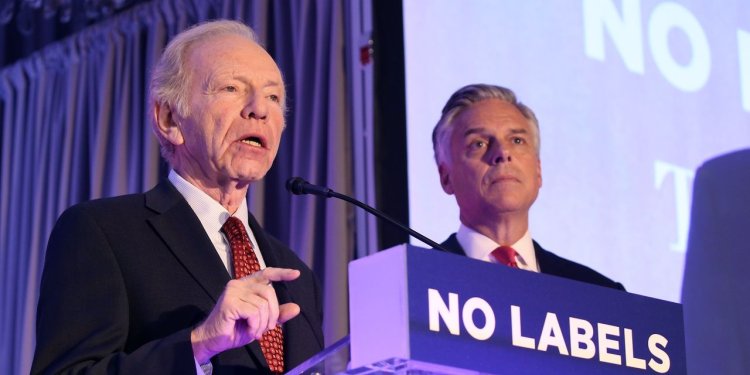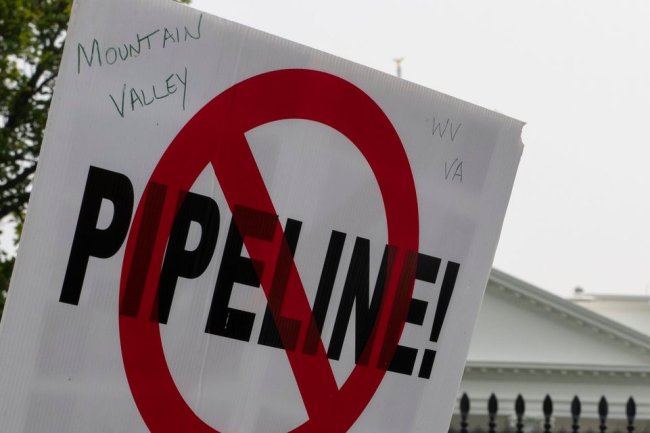‘No Labels’ Equals Trump?
A third party calling itself an ‘insurance policy’ won’t exactly stir voter passions. By William McGurn July 17, 2023 6:12 pm ET Joe Lieberman and Jon Huntsman speak at an event in Washington, Dec. 5, 2016. Photo: Paul Morigi/Associated Press It’s probably not a good sign when a political party tells voters that it will stand down if it looks likely to make a difference in the outcome of an election. But that’s what No Labels founding chairman Joe Lieberman did this weekend on ABC’s “This Week.” Mr. Lieberman, the Democratic former senator and vice presidential candidate, spoke on the eve of a town hall meeting at St. Anselm’s College in New Hampshire—a popular venue in an early primary state. “We’re not in this to be spoilers,” Mr. Lieberman


Joe Lieberman and Jon Huntsman speak at an event in Washington, Dec. 5, 2016.
Photo: Paul Morigi/Associated Press
It’s probably not a good sign when a political party tells voters that it will stand down if it looks likely to make a difference in the outcome of an election. But that’s what No Labels founding chairman Joe Lieberman did this weekend on ABC’s “This Week.” Mr. Lieberman, the Democratic former senator and vice presidential candidate, spoke on the eve of a town hall meeting at St. Anselm’s College in New Hampshire—a popular venue in an early primary state.
“We’re not in this to be spoilers,” Mr. Lieberman said. “If the polling next year shows, after the two parties have chosen their nominees, that in fact we will help elect one or another candidate, we’re not going to get involved.”
It’s an odd statement of purpose. Then again, this is a party that believes that the way to inspire voters is to call itself an “insurance policy.” The No Labels argument is that America deserves a better choice than Donald Trump or Joe Biden.
But what does that mean? Mr. Trump is polling at 53.8% in the Real Clear Politics average. If he secures the GOP nomination, it will be because Republican voters chose him.
Ditto for Mr. Biden. He’ll be his party’s nominee if he succeeds in getting more votes than other Democrats. It isn’t Mr. Biden’s fault that the only ones willing to take him on are gadflies such as Robert F. Kennedy Jr. and Marianne Williamson. If heavyweight Democratic governors such as Gavin Newsom and Gretchen Whitmer don’t get in, that’s on them.
Read More Main Street
- The ‘Ongoing Investigation’ Dodge on Hunter Biden July 10, 2023
- Edward Blum, the Man Who Killed Affirmative Action July 3, 2023
- Joe Biden’s ‘Malarkey’ Defense of Hunter June 26, 2023
In presidential races, third parties typically represent some overriding principle, such as libertarianism or green ideology, that supporters believe is insufficiently represented. In 1992 H. Ross Perot ran on a populist platform of economic nationalism and received almost 19% of the total vote. But when a third party’s defining issue is that is it too good for the matchup produced by the other two parties’ voters—in this case, Trump vs. Biden— it can look like virtue signaling.
No Labels points to polls showing Americans also prefer a different choice. The problem is that what many of these people really don’t like is the other party’s candidate.
For example, a Republican primary voter may prefer Ron DeSantis or Nikki Haley over Mr. Trump. But what that voter may really object to is the possibility that putting Mr. Trump on the ticket may help re-elect President Biden to a second term. Such a voter is almost certain to pull the lever for Mr. Trump in a general election.
The same is true of Democrats. An AP poll of Democratic voters in April found that fewer than half (47%) want Mr. Biden to run again in 2024. But 81% of these same Democrats say they will vote for him if he becomes their party’s nominee.
Insurance policies are a hard sell here. Nonetheless, No Labels tried on Monday with its town hall featuring not only former politicians like Mr. Lieberman but also incumbent West Virginia Sen. Joe Manchin—a Democrat at odds with the leftward lurch of his party. Mr. Manchin is often thought the ideal candidate for the top of a No Labels presidential ticket.
But Mr. Manchin also embodies the No Labels dilemma. Although he has been a thorn in the side of his party, among his own West Virginia voters he is known as the man who caved when he was most needed. His vote last year saved President Biden’s $700 billion Inflation Reduction Act and hurt him with his state’s voters. Mr. Manchin, whose current term ends in 2024, is also trailing in the polls against his likely Republican opponent for re-election, former West Virginia Gov. Jim Justice.
In New Hampshire the No Labels leaders also talked up their new policy booklet, “Common Sense.” Named after the fiery Thomas Paine pamphlet that helped ignite the Revolutionary War, “Common Sense” is about what you would expect from those selling an insurance policy.
In other words, there’s something for everyone. Except the passion of Paine’s original. Oh, for one sentence like this: “But where says some is the King of America? I’ll tell you Friend, he reigns above, and doth not make havoc of mankind like the Royal Brute of Britain.”
By contrast, the new “Common Sense” hails “the passage of historic bipartisan legislation like the 2021 Infrastructure Investment and Jobs Act” as an example of what can be accomplished.
Still, with all its outward obstacles and inward contradictions, the No Labels movement has achieved one significant victory. Ironically, it’s a highly partisan one. The new party is loathed by all the Never Trumpers—from Lincoln Project co-founder Rick Wilson to former Obama strategist David Axelrod. They see a third-party challenge taking more votes away from Mr. Biden than Mr. Trump. They’re probably right.
But it’s a free country. If No Labels wants to put forward a candidate despite the odds, it is free to do so. The real lesson here is that parties don’t get to choose the other party’s candidate.
Write to [email protected]
Journal Editorial Report: Paul Gigot interviews Doug Schoen. Images: Getty Images/CNP/Zuma Press Composite: Mark Kelly The Wall Street Journal Interactive Edition
What's Your Reaction?

















